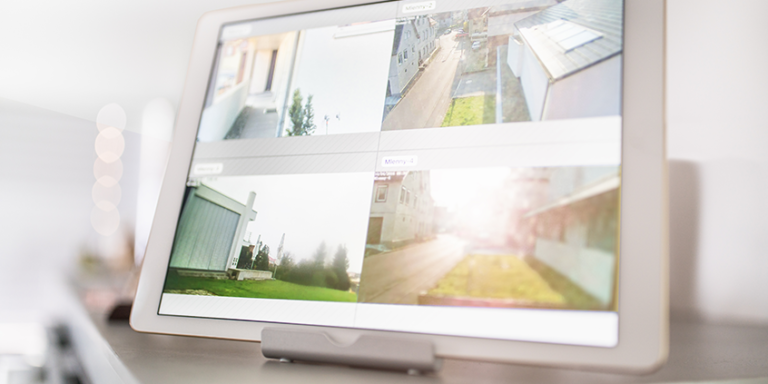Home Security Monitoring

Short Summary
- Understand home security monitoring to protect your property and family.
- Consider professional or self-monitoring services, top systems with monitoring services, response time & customer support when choosing a service.
- Enhance system with additional devices. Consider data privacy measures & costs of the service for optimal protection.
Understanding Home Security Monitoring
Home security monitoring is essential for safeguarding your home or building from intruders, acting as a deterrent to potential break-ins, scaring away intruders if they do gain access, and alerting the relevant authorities in case of an emergency. Moreover, a good security system can potentially reduce your home insurance premium by up to 10%. With so many options on the market, it’s crucial to understand how these systems work and the components they comprise.
A typical home security system consists of electronic components that communicate with a central control panel. These systems can be wireless, utilizing a cellular network to communicate and transmit radio waves, or wired, with sensors and components connected to the control panel via wires. A wireless security system often includes smart devices, such as smart video doorbells, motion and sound sensors, smart locks, and night-vision cameras, for enhanced security and convenience in wireless home security systems.
- When setting up a home security system, there are a few options to consider.
- Some providers offer professional installation, where a technician will come to your home and set up the system for you.
- Other providers require self-installation and setup, where you will receive the equipment and instructions to install it yourself.
- Wireless systems are ideal for rental properties, as they can be easily installed and removed without damaging the property.
- DIY systems are suitable for almost any living situation, including rental houses and apartments, as they are customizable and can be easily moved.
- It’s essential to evaluate your specific needs and preferences to find the best home security system for you.
Professional Monitoring
Professional monitoring services offer round-the-clock surveillance and rapid response to any emergencies, ensuring the security of your home and family. These services are often included as an option in the best home security systems for added peace of mind. But what are the advantages of professional monitoring, and what factors should you consider when selecting such a service?
Professional monitoring services provide 24/7 surveillance, responding quickly to any emergency situations, and guaranteeing the security of your home and family. Motion sensors are a common component of these services, helping to detect any unauthorized movement within your property. This level of protection ensures that your home is constantly monitored by emergency services, allowing you to relax and focus on other aspects of your life.
When selecting a professional monitoring service, it’s essential to evaluate factors such as:
The monitoring level desired
- The provider
- Emergency response options
- Contract durations
- Any additional costs
Be prepared for a 24/7 professional monitoring fee, typically included in the cost of a complete home security system, which may also cover equipment, installation, and additional features.

Self-Monitoring
Self-monitoring provides homeowners with the flexibility and control to monitor their property through smartphone apps and notifications. A wireless alarm system can be an excellent choice for self-monitoring, as it allows for easy installation and integration with other smart home devices.
But what are the advantages and disadvantages of self-monitoring, and what options are available? The advantages of self-monitoring include flexibility and control over your security system, while the drawbacks include requiring monthly subscriptions and the potential inability to contact emergency personnel in the event of a breach. Some self-monitoring systems are compatible with voice assistants like Alexa and Google Assistant, allowing for convenient control and integration with other smart home devices.
Ultimately, the choice between professional monitoring, self-monitoring, or a combination of both depends on your unique requirements and preferences.
Top Home Security Systems with Monitoring Services
With countless home security systems offering monitoring services, it can be challenging to find the right one for your needs and budget. To help you make an informed decision, we’ve compiled a comprehensive list of top home security systems that provide reliable monitoring services, catering to various requirements and budgets. Some of the top home security systems with monitoring services include:
- Vivint
- Alarm Relay Inc.
- ADT Home Security
- SimpliSafe
Each of these security systems offer unique features and benefits to cater to different needs and preferences, such as customizable DIY systems, professional monitoring services, top-rated security systems of 2023, and cost-effective monitoring options.
When comparing these top home security systems, it’s essential to consider the features offered by each system, such as monitoring level, equipment, installation, and warranty. Additionally, evaluate the costs and pricing options for each system, taking into account upfront fees, monthly subscriptions, and additional charges for equipment and features.
By considering these factors and examining your specific needs, you can make an informed decision and choose the right home security system with monitoring services that best suits your requirements.
Factors to Consider When
Choosing a Monitoring Service
When selecting a monitoring service for your home security system, there are several factors to consider. Response time, customer support, and additional features such as smart home integration play a crucial role in determining the right monitoring service for you. The purpose of a monitoring subscription is to provide a service that eliminates the need for 24/7 availability in the event of an alert. When evaluating security companies, it’s essential to assess their customer service policies and real customer reviews to verify the company’s claims.
Smart Home Integration and Compatibility
Smart home integration and compatibility with various devices and platforms are essential for efficient home security monitoring, as they offer convenience and an extra layer of security for your home. In our assessment of the top home security systems, smart home compatibility accounts for 15% of the evaluation.
Managing a security system via a smart home application provides users with the freedom to access their system remotely without compromising their security. Compatibility with smart gadgets, especially those that support voice control, is an important consideration when selecting a home security system. This ensures smooth integration and a more comprehensive security solution for your home.
Enhancing Your Home Security System
with Additional Devices
To create a more robust and comprehensive security solution, you can enhance your home security system with additional devices like security cameras, sensors, and smart locks. These devices can greatly improve the overall security of your home, providing added protection and peace of mind.
For instance, some common home security devices include:
- Door or window sensors: These create an electrical circuit that, when broken while the system is armed, sends a notification to the control panel and activates the alarm.
- Motion detectors and outdoor cameras: These can help detect any unauthorized movement within your property.
- Smart locks: These provide keyless entry and remote access for added convenience.
By integrating these additional devices into your home security system, you can ensure a more thorough and effective security solution for your home.
Protecting Your Privacy and Data Security
When using home security monitoring services, it’s essential to protect your privacy and data security. One potential risk associated with home security monitoring services is the heightened possibility of hacking. To address this concern, it’s crucial to ensure that the chosen system has strong security measures in place.
When evaluating home security systems, Wirecutter thoroughly examines the security and data-privacy practices of the companies whose products they recommend, investigating how they deal with customer data.
Costs and Pricing of Home Security
Monitoring Services
When selecting a home security monitoring service, costs and pricing play a significant role in your decision-making process. The cost structure for home security monitoring services includes upfront fees, monthly subscriptions, and additional charges for equipment and features. Understanding these costs can help you find a security system that fits within your budget.
Initial costs associated with home security systems can range from a few hundred dollars for a comprehensive system to $30 to $250 for cameras.
In addition to these costs, homeowners should also be aware of potential savings on their monthly insurance premiums. Installing a security system in your home may qualify you for considerable reductions on your insurance premiums, further justifying the investment in a reliable home security system.
Summary
In conclusion, home security monitoring is a crucial aspect of protecting your home and ensuring peace of mind. By understanding the various types of monitoring services, assessing top home security systems, and considering factors such as smart home integration, privacy, and costs, you can make an informed decision and choose the best security solution for your specific needs. Invest in a robust home security monitoring system today, and safeguard your home and loved ones for a safer, more secure future.
Frequently Asked Questions
ADT, Vivint, SimpliSafe, and Alarm Relay are some of the best home security brands that offer professional monitoring.
These brands provide a range of features, such as motion sensors, door and window sensors, and 24/7 monitoring. They also offer a variety of packages to fit any budget.
ADT monthly pricing starts at $36.99 for basic monitoring, and can go up to $62.99 for video and home automation with a 3 to 5 year contract.
Professional monitoring offers 24/7 surveillance and quick response to emergencies, while self-monitoring gives homeowners the convenience of monitoring their property with smartphone apps and notifications.
With professional monitoring, homeowners can rest assured that their property is being watched around the clock. Self-monitoring, on the other hand, allows homeowners to keep an eye on their property from anywhere with their smartphone. They can receive notifications when something happens.

